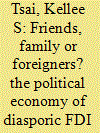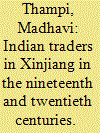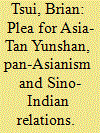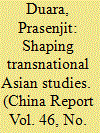| Srl | Item |
| 1 |
ID:
108232


|
|
|
|
|
| Publication |
2010.
|
| Summary/Abstract |
This article analyzes the labour regime that has taken shape in the construction sector in post-reform India and China. In both countries, expansion of the urban sector has entailed large-scale labour mobilization of wage workers from the lowest agrarian strata. Based on an examination of flexibilities in labour con-tracts, wage-related issues and the enclosures built into the worksites, it argues that there is a striking parallel in India and China, both in the process involved in the formation of labour regimes as well as in the outcome it has produced for the workers in the construction sector.
|
|
|
|
|
|
|
|
|
|
|
|
|
|
|
|
| 2 |
ID:
108231


|
|
|
|
|
| Publication |
2010.
|
| Summary/Abstract |
Focusing exclusively on foreign direct investment (FDI) as a comparative measure of capital inflows obscures another significant source of funds-that of monetary remittances. This article emphasizes the empirical and analytic value of disaggregating FDI data and analyzing remittance trends in the two most populous developing countries in the world, China and India. While identifying the determinants of FDI inflows dominates much of the literature on FDI, this article suggests that the concept of FDI may not be the most meaningful indicator of relative developmental performance, especially given the reality of national definitional differences in FDI, roundtrip capital, growth in portfolio investment and variation in the sources and uses of realized FDI. In this context, the article examines what motivates the respective diasporas to send money back to their homelands in the form of FDI versus remittances and the local developmental implications of these diasporic flows. It proposes that attending to vernacular modes of capital formation such as ethnic and transnational networks presents an analytic opportunity to generate more empirically accurate and nuanced theories of political economy.
|
|
|
|
|
|
|
|
|
|
|
|
|
|
|
|
| 3 |
ID:
108233


|
|
|
|
|
| Publication |
2010.
|
| Summary/Abstract |
Naturalizing a global 'world of capitalist totality' serves as a modality for normalizing global processes of capital accumulation. However 'global' remains a project evinced in specific forms of cultural action and practices. This preliminary article juxtaposes two vastly separated spheres of global economy and society that are rarely considered together. The haute sphere of a crisis ridden global financial system increasingly sees its salvation in mobilizing and disposing of the 'surpluses of the Orient' in a manner that speeds up global capital accumulation. In this light the financial crisis and the enhanced global role and aspirations of Asian states, in particular China and India, may lead to compromises in the ways both states have articulated local, national and global accumulation processes to one another, and mediated their impact on marginalized domestic social groups. Historians have traditionally misrecognized struggles of subordinated social groups to resist surrendering their claims to capital or resist proletarianization. It has now become more important than ever to revisit these struggles and their redoubts to uncover cultural and political actions for grounding the 'global', and the practices, idioms and relationships of resistance to them.
|
|
|
|
|
|
|
|
|
|
|
|
|
|
|
|
| 4 |
ID:
108230


|
|
|
|
|
| Publication |
2010.
|
| Summary/Abstract |
The presence of Indian traders in Xinjiang is largely discounted as a factor of significance when analyzing the relations between India and China in the modern era. However, hundreds of Indian sojourners and settlers were present in the main towns and surrounding areas of southern Xinjiang over a period of several centuries until the middle of the twentieth century. This article explores how the rivalry between the expanding British Indian and Russian empires, as well as the turbulent politics of the Republican era in China, placed insurmountable difficulties in the way of this once-resilient group of Indian merchants, eventually leading to their complete exodus from this region of China by the late 1940s.
|
|
|
|
|
|
|
|
|
|
|
|
|
|
|
|
| 5 |
ID:
108228


|
|
|
|
|
| Publication |
2010.
|
| Summary/Abstract |
From the Confucian perspective, a sage should possess three characteristics: a noble moral character; profound knowledge, and a remarkable ability to put his ideals into practice. Sages are born out of the circumstances of their times, they are the inheritors and promulgators of worthy traditions; in short, they are the 'divine workers' in human history. Sages understand 'the Way' (Dao) and 'the divine', however, from their own perspective. The Way or the divine is nothing but a highly developed and refined way of life. This is 'culture'. This means that humans must consciously transform their qualities to make their human nature more perfect. Seen in this light, sages are 'models' of progression in the self-consciousness of human beings.
|
|
|
|
|
|
|
|
|
|
|
|
|
|
|
|
| 6 |
ID:
108229


|
|
|
|
|
| Publication |
2010.
|
| Summary/Abstract |
In 1927, the Buddhist scholar, Tan Yunshan, travelled to Santiniketan on the invitation of Rabindranath Tagore to teach Chinese at Visva Bharati University. Subsequent years would see him develop close ties with the Guomindang and Congress leaders, secure Chinese state funding for the first sinological institute in India and mediate between the nationalist movements during the Second World War. That a relatively marginal academic, who participated in neither the May Fourth Movement nor any major political party, and who had little prior experience of India, could have played such an important role in twentieth century Sino-Indian relations raises questions over the conditions that made possible Tan's illustrious career. This article argues that Tan's success as an institution builder and diplomatic intermediary was attributable to his ideological affinity with the increasing disillusionment with capitalist modernity in both China and India, the shifting dynamics of the Pan-Asianist movement and the conservative turn of China's nationalist movement after its split with the communists in 1927. While Nationalist China and the Congress both tapped into the civilizational discourse that was supposed to bind the two societies together, the idealism Tan embodied was unable to withstand the conflict of priorities between nation-states in the emerging Cold War order.
|
|
|
|
|
|
|
|
|
|
|
|
|
|
|
|
| 7 |
ID:
108227


|
|
|